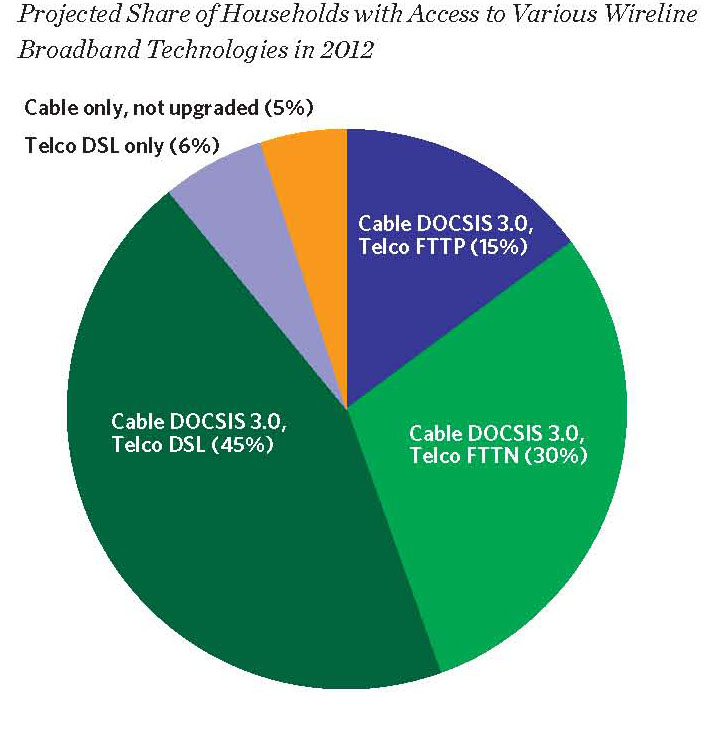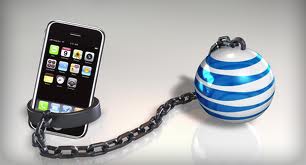|
|
In this edition of Views and News, we examine the state of the telco/cable rivalry for broadband Internet access in light of the escalating demand for increasingly higher-speed services, and suggest that the battle may be nearing an end, with cable the ultimate winner. We examine AT&T's plan to link "FaceTime" over cellular functionality to its new shared data plans and the implications for network neutrality. Finally, we compare wireless pricing options from AT&T and Verizon against aggressive new offerings from smaller rivals.
Read on below, or navigate over to
econtech.com
where you can read online, or download a
printer-friendly version.
|
|
Redefining "broadband" and constructing a new market reality
|
|
 In March 2010, and with considerable fanfare, the FCC released its blueprint for universal broadband – the "National Broadband Plan" ("NBP"). The NBP set out as a national goal to "[e]nsure universal access to broadband network services" by creating "the Connect America Fund (CAF) to support the provision of affordable broadband and voice with at least 4 Mbps actual download speeds and shift up to $15.5 billion over the next decade from the existing Universal Service Fund (USF) program to support broadband." For many years, policymakers had defined "broadband" as a service providing a data rate of at least 200 kpbs in at least one direction. So the notion of a minimum threshold for "broadband" of 4 mpbs was certainly seen as a step in the right direction. But by the standards of 2012 – just two years after the FCC's Plan was published – 4 mbps seems rather pedestrian.
In March 2010, and with considerable fanfare, the FCC released its blueprint for universal broadband – the "National Broadband Plan" ("NBP"). The NBP set out as a national goal to "[e]nsure universal access to broadband network services" by creating "the Connect America Fund (CAF) to support the provision of affordable broadband and voice with at least 4 Mbps actual download speeds and shift up to $15.5 billion over the next decade from the existing Universal Service Fund (USF) program to support broadband." For many years, policymakers had defined "broadband" as a service providing a data rate of at least 200 kpbs in at least one direction. So the notion of a minimum threshold for "broadband" of 4 mpbs was certainly seen as a step in the right direction. But by the standards of 2012 – just two years after the FCC's Plan was published – 4 mbps seems rather pedestrian.
Continue reading at econtech.com
|
|
Do AT&T's plans for the iPhone 5 run afoul of the FCC's Net Neutrality rules?
|
|
 The iPhone 4, introduced by Apple in 2010, included an app known as FaceTime that enabled users of various Apple products – iPhones, iPads and Macintosh computers – to conduct full-screen, full-motion two-way video chats. However, FaceTime on wireless devices (iPhones, iPads) could only be used over wi-fi, and not over 3G cellular services. Apple recently announced that its next generation of iPhone, expected to be called the iPhone 5, and a new operating system for the iPhone and iPad, IOS 6, both due out in the next month or so, will provide the ability for FaceTime video chats to also be conducted over 3G/4G wireless data services.
The iPhone 4, introduced by Apple in 2010, included an app known as FaceTime that enabled users of various Apple products – iPhones, iPads and Macintosh computers – to conduct full-screen, full-motion two-way video chats. However, FaceTime on wireless devices (iPhones, iPads) could only be used over wi-fi, and not over 3G cellular services. Apple recently announced that its next generation of iPhone, expected to be called the iPhone 5, and a new operating system for the iPhone and iPad, IOS 6, both due out in the next month or so, will provide the ability for FaceTime video chats to also be conducted over 3G/4G wireless data services.
Earlier this month, AT&T announced that it would not only support FaceTime connections on its wireless data service plans, but would not even count data usage consumed on FaceTime calls against the customer's total data bandwidth allowance. But there was a catch: These benefits would be available only to those AT&T customers who signed up for family shared data plans.
Continue reading at econtech.com
|
|
Second Tier Wireless Carriers Undercut AT&T/Verizon
|
|
 The wireless industry has always been characterized by imitative pricing – when one of the major carriers breaks rank and makes a major change to its prices or rate structure, the other carriers will usually follow suit without much delay. Sometimes these imitative pricing plans are rolled out within less than 24 hours, as was the case when AT&T began offering flat rate, unlimited service in February 2008. Verizon and T-Mobile launched nearly identical offerings on the very same day, while Sprint took two weeks to announce its response. Similar follow-the-leader pricing occurred with the introduction of tiered data plans, increasing early termination fees for smartphones, and in numerous other instances dating back to AT&T's launch of the Digital One Rate plan that eliminated roaming charges and prompted the change from regional to nationwide pricing industry-wide.
The wireless industry has always been characterized by imitative pricing – when one of the major carriers breaks rank and makes a major change to its prices or rate structure, the other carriers will usually follow suit without much delay. Sometimes these imitative pricing plans are rolled out within less than 24 hours, as was the case when AT&T began offering flat rate, unlimited service in February 2008. Verizon and T-Mobile launched nearly identical offerings on the very same day, while Sprint took two weeks to announce its response. Similar follow-the-leader pricing occurred with the introduction of tiered data plans, increasing early termination fees for smartphones, and in numerous other instances dating back to AT&T's launch of the Digital One Rate plan that eliminated roaming charges and prompted the change from regional to nationwide pricing industry-wide.
In Views and News, June 2012, we discussed Verizon's launch of new "Share Everything" plans, which cater to large families with many data-driven devices. Predictably, AT&T launched its own version of these share plans shortly thereafter. Surprisingly, however, the rest of the industry has not followed suit. Chief rivals Sprint and T-Mobile have decried the new plans as bad for consumers, and rather than move towards more restrictive data pricing, T-Mobile is reverting back to unlimited data packages. But there are even more interesting pricing trends percolating up from the second tier of wireless carriers, with offerings that undercut AT&T and Verizon by wide margins.
Continue reading at econtech.com
|
|
|
|
About ETI. Founded in 1972, Economics and Technology, Inc. is a leading research and consulting firm specializing in telecommunications regulation and policy, litigation support, taxation, service procurement, and negotiation. ETI serves a wide range of telecom industry stakeholders in the US and abroad, including telecommunications carriers, attorneys and their clients, consumer advocates, state and local governments, regulatory agencies, and large corporate, institutional and government purchasers of telecom services. |
|
|